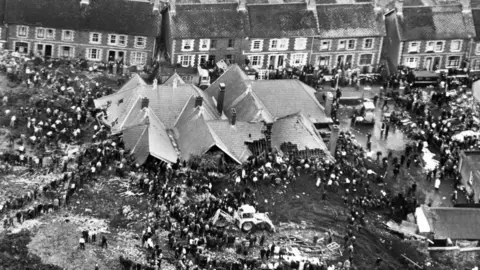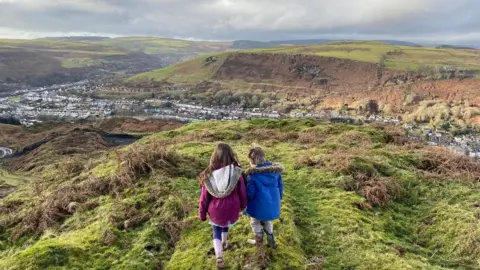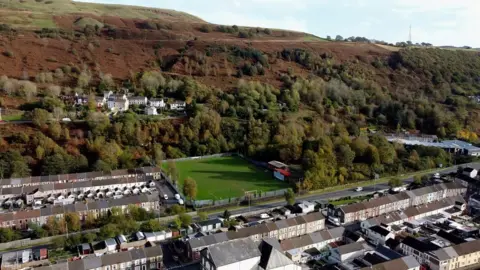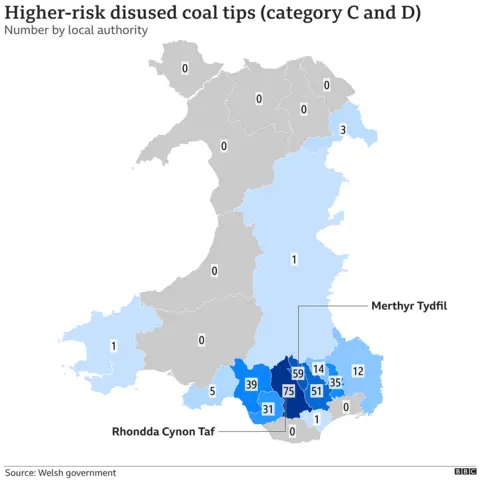Climate change: Living by coal tip leaves family fearing rain
Every time it rains, Phil Thomas is beset with worry and anxiety after finding out his young family are living below a potentially dangerous coal tip.
He has even thought about which way to run "if something starts pouring down the hill" behind their home.
"We've got no chance in reality," the 39-year-old father of two admits.
Concerns about coal tips in Wales were put into stark focus when heavy storms caused 60,000 tonnes of spoil to run down a hillside in 2020.
No-one was injured in the slip down the empty valley at Tylorstown in Rhondda Cynon Taf, but the Welsh government has since revealed there are still almost 2,500 disused tips.
Most have been concealed by nature and largely forgotten about but 327 are still classed as "higher risk", meaning they need to be regularly inspected for signs of movement, although do not necessarily pose an "imminent" threat.
The Welsh government is yet to say publicly where the most dangerous tips are or how many people live beneath them.
 PA Media
PA MediaIt was in February last year that Phil, who runs a microbrewery, sat down at his local archives as a last resort after months of failing to get answers about a potential coal tip near his village of Ynyshir in Rhondda Cynon Taf.
He hoped the dusty old document in front of him could finally put his mind at rest.
Instead, the report, written in the wake of the Aberfan disaster that killed 144 people in 1966, showed that his house - along with 20 others - had been described as "at risk" by engineers investigating the safety of the local tip.
 Clear South Wales' Coal Tips
Clear South Wales' Coal Tips"It made me sick to the core of my stomach," he said.
"I've got a family, that's our house. We've been there for eight years. This hasn't ever been mentioned, even when we purchased the house."
Such was the concern in the report done half a century ago, there was even a sentence about how much it might cost to buy the residents out of their homes.
In his community, the tip had been largely forgotten about over the decades - grass now covers the open black scars that once made them so easy to spot on the hillside.
"I thought, perhaps naively, that most of the coal tips were made safe," said Phil.
"It makes you worried every time that it rains that something could happen, not just for me but for the 327 other high-risk tips out there in Wales.
"What do we do if something starts pouring down the hill? We've got no chance.
"If we could get the information today, I'm certain that people would be safer than they are without the information."
At the same time that Phil started his own quest for answers, both the Welsh and UK governments set up a coal tip safety taskforce.

The Welsh government quickly concluded that climate change and increased rainfall meant "hundreds of millions of pounds" were needed to make "legacy" coal tips safe for good.
Wales' climate change minister has since said plans were in place for a mobile phone alert system which could warn residents "if there is a problem".
The Welsh government said it would not reveal the precise locations of coal tips until later this year because of extra checks with "accuracy" and potential "data protection issues".
The Welsh government has already admitted that insurance and housing will likely be among the things affected when people find out they live underneath these tips.
As many as 70% of Wales' coal tips are believed to be on private land, including the one overshadowing Phil's family home.


However, the law means that councils have little ability to force an intervention unless they can prove a private tip is a "clear and imminent threat".
It is a system described as "unfit for purpose" by some local authorities - and the Welsh government has asked the Law Commission to review the current setup.
The Welsh government said it was "trialling different methods to understand the best technology that could be used to inform of any changes in the stability of the tips" as it was "vital" they made the right choice.
"In time, we would like to be able to share this information directly with people in local communities but need to do this in a way that we do not create false alarm or concern," a spokesman said.
